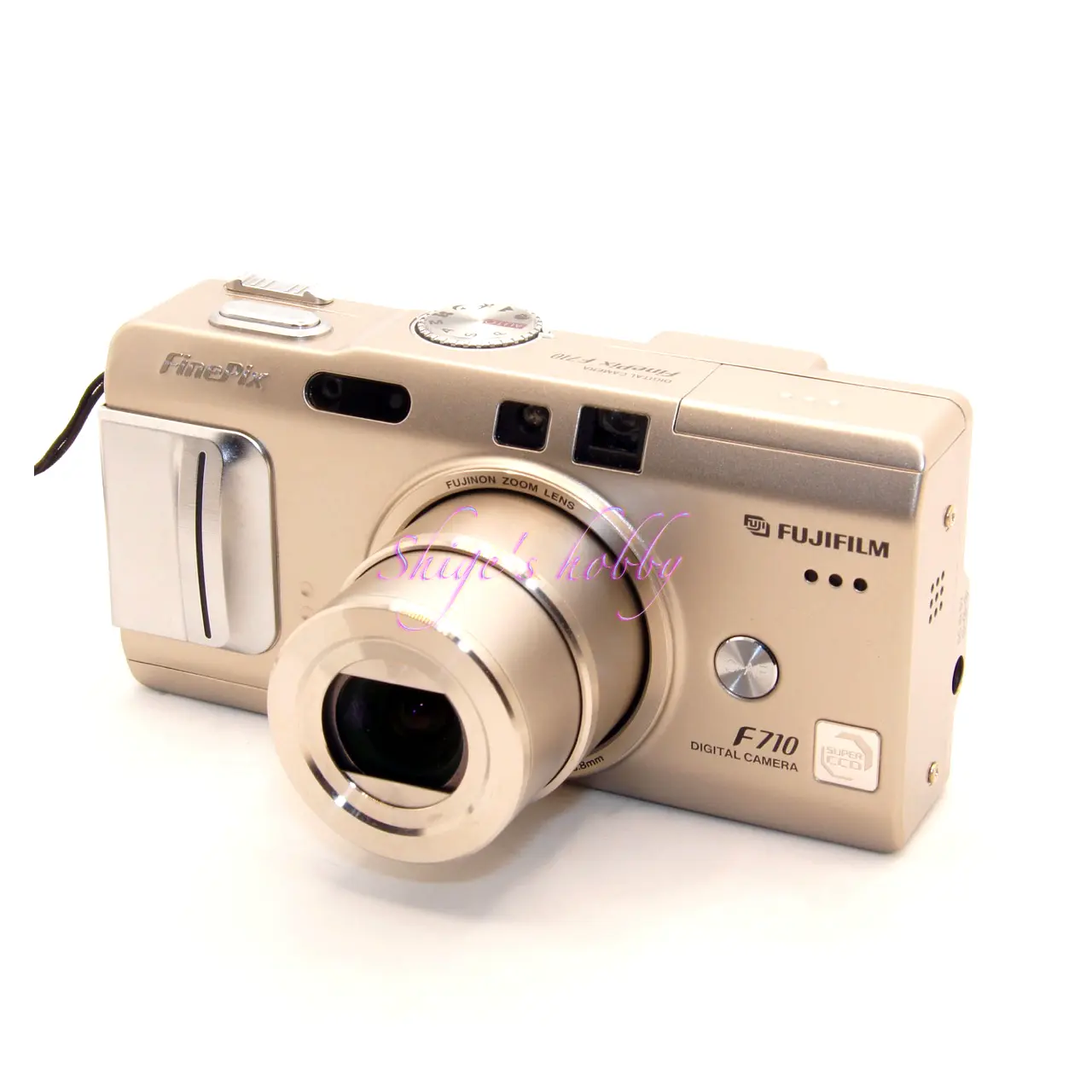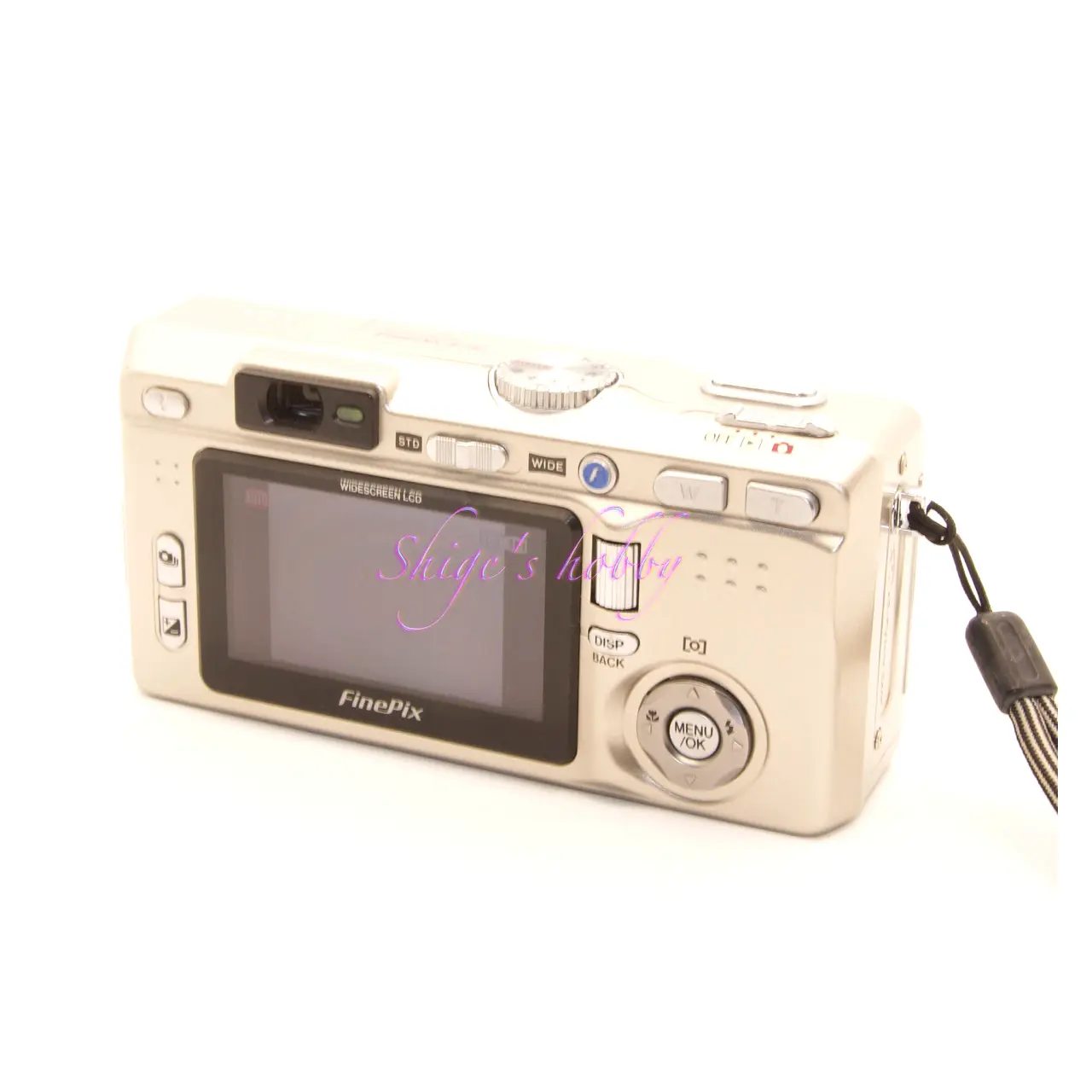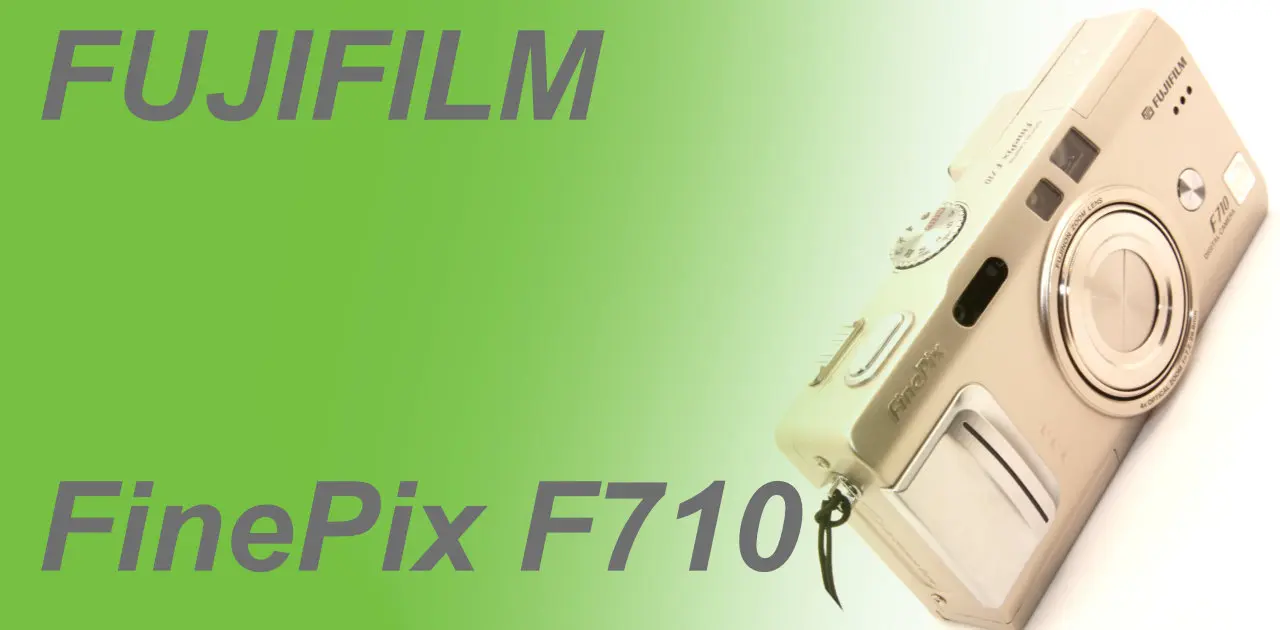Last updated on 2025-09-02
A review of the FUJIFILM Finepix F710 and sample photos.
- Please see the disclaimer regarding advertising here.
- Italicized links in the text are advertisement links that take you to other sites.
Table of contents

Gallery
Review


1.Overview
The FinePix F710 is a Fujifilm compact digital camera with a landscape format that was released in March 2004.
Its main specifications include a 4x zoom lens (32.5-130mm in 35mm equivalent), a Super CCD Honeycomb IV SR image sensor with a 1/1.7-inch sensor size and 6.2 megapixels (S pixels: 3.1 megapixels, R pixels: 3.1 megapixels), and an NP-40 battery.
The camera supports XD Picture Cards up to 2GB in size. Some cameras with full firmware may reach the 512MB limit. For more information on XD Picture Cards, please see the “Specifications and Considerations” section.
The camera’s detailed specifications, along with those of the FinePix F700 and FinePix F810, are listed in the table below.
2.Usability
The FinePix F710 is a 20-year-old camera, so it’s probably quite old even among old compact digital cameras. I inserted two AA batteries and turned it on for the first time in over 20 years, and it started up and took pictures without any problems.
Although it’s a Honeycomb SR, it’s based on a 3-megapixel digital camera, so don’t expect too much.
JPEG images often seem lackluster, so although it’s a bit of a hassle, you should shoot in RAW and adjust the images with the appropriate parameters in development software.
The lens covers a slightly wider range than the FinePix from the same period, at 33-130mm in 35mm equivalent. While it’s only slightly better than 35mm, the 2mm difference on the wide-angle side makes a big difference.
Fujifilm’s adoption of a 28mm wide-angle lens began with the FinePix F100d in 2008, so it’s quite late.
The NP-40 battery has modest specs, with a voltage of 3.7V and a capacity of 710mmAh, allowing it to take only around 100 shots at its official specifications, and even fewer in Raw mode, which requires longer processing times.
The recording pixel count is 6 megapixels (2832 x 2128 pixels), and the F710’s Raw data (RAF file) is 13MB. This is slightly less than the 18MB of uncompressed data from a typical 6 megapixel sensor.
Based on Yushi’s previous testing, this is thought to be due to the fact that Super CCD Honeycomb IV SR sensor images are primarily S pixels, containing the full 3 megapixel data, while R pixels are used to fill in areas with overexposure, recording only a portion of the 3 megapixels. Therefore, the 3 megapixel data is essentially interpolated and recorded at 6 megapixels.
To develop the RAF images from the F710, I used Fujifilm’s “X RAW STUDIO,” but it didn’t work on its own. Instead, I had to connect the camera with the memory card inserted to a PC and use the camera’s internal chip for development. This seemed like the same results as shooting in JPEG format, so I used this software only to view thumbnails.
I actually used Affinity Photo 2 as the development software, but since the color tones displayed in the thumbnails in “X RAW STUDIO” were quite different from the default colors loaded in Affinity Photo 2, it seemed like “X RAW STUDIO” displayed the image data in a reasonably well-processed state even without connecting the camera.
Using s7raw, a Windows-specific development software, I could adjust the blending ratio of S and R pixels. Unfortunately, this software isn’t available for Mac. It’s available in 32-bit and 64-bit versions for Intel (AMD) CPUs. While the download link on the official website is no longer available, you can download it from SOFTPEDIA. When I used it on Windows 10, I was able to process data from a FinePix F710 without any problems.
When I used it for the first time in 20 years, I encountered a zoom error that prevented the lens from retracting, a common problem with Fujifilm compact digital cameras. This is caused by plastic gears and other parts in the lens retraction mechanism breaking down due to deterioration. Even though this is a cost-cutting measure, it is much weaker than older cameras.
Used cameras can sometimes be found for a considerable price, but since the processing system is from the 2000s, compact digital cameras from the technologically advanced 2010s are undoubtedly much more versatile.
3.Summary
In onclusion , to sum up the FinePix F710, its horizontal form is a unique camera design that predates the advent of larger LCD displays, and I like it.
In terms of digital camera performance, despite the advertised expansion of dynamic range provided by the SR sensor, the results are not noticeable. The final result is at best a difference in image quality, so don’t get your hopes up.
Specifications, considerations, etc.
There are only two digital cameras equipped with the Super CCD Honeycomb IV SR: the FinePix F700 and the FinePix F710. The FinePix F810, which has the same body shape, has a different sensor format.
As you can see from the fact that the successor camera, the FinePix F810, is equipped with a 6-megapixel sensor, other companies are already increasing the number of cameras that use sensors with real 6-megapixel or more pixels.
XD Picture Card (hereafter referred to as XD Picture) is a memory card standard established by Fujifilm and Olympus, the winners of compact digital cameras in the 2000s. Due to lack of experience in creating standards, this recording media had problems with expandability, compatibility, and speed. In the end, it was a sad standard that was short-lived as it could not resist the onslaught of SD cards.
XD Picture is available in capacities of 16MB, 32MB, 64MB, 128MB, 256MB, 512MB, 1GB, and 2GB, but older cameras have a limit of 512MB.
The FinePix F710 I have is able to use 2GB of XD Picture with firmware 1.55. According to a Fujifilm news release, the supported XD Picture size is 512MB, so if you have older firmware, you may be limited.
I saw a statement in “Playing with the FinePix F700” that the FinePix F700 also supports large-capacity XD Picture with firmware 3.0 or later.
Depending on the firmware, the FinePix F810 may also fall under the 512MB limit.
XD Pictures was used in compact digital cameras from Olympus and Fujifilm in the 2000s, but the downside is that the memory cards themselves are scarce, so the unit price per recording capacity on the secondhand market is quite high.
| Items | FinePix F700 | FinePix F710 | FinePix F800 |
| Number of pixels | 6.2 million pixels (S pixels: 3.1 million pixels R pixels: 3.1 million pixels) | 6.2 million pixels (S pixels: 3.1 million pixels R pixels: 3.1 million pixels) | 630万画素 |
| Sensor type | Super CCD Honeycomb IV SR | Super CCD Honeycomb IV SR | Super CCD Honeycomb IV HR |
| Sensor size | 1/1.7 | 1/1.7 | 1/1.7 |
| Lens | f=7.7mm~23.1mm (equivalent to 35mm~105mm on a 35mm camera) | f=7.2mm to 28.8mm (35mm film equivalent, STD: 32.5mm to 130mm equivalent) | f=7.2mm to 28.8mm (35mm film equivalent, STD: 32.5mm to 130mm equivalent) |
| Aperture | F2.8~F4.9 | F2.8~F5.6 | F2.8~F5.6 |
| OVF | Real image optical zoom viewfinder | Real image optical zoom viewfinder | Real image optical zoom viewfinder |
| Rear LCD Size | 1.8 inch | 2.1 inch | 2.1 inch |
| Rear LCD resolution | 134,000 pixels | 173,000 pixels | 173,000 pixels |
| Battery | NP-40 | NP-40 | NP-40 |
| Recording media | xD-Picture Card Official (16-256MB) Supports 1GB and 2GB with latest firmware | xD-Picture Card Official (16-512MB) Supports 1GB and 2GB with latest firmware | xD-Picture Card Official (16-512MB) Supports 1GB and 2GB with latest firmware |
| Size (mm) Width x Height x Depth | 108 × 54 x 28 | 110 × 54 x 29 | 110 × 54 x 29 |
| Weight (g) (fully equipped) | 190 | 225 | 220 |
| Release date | 2003.summer | 2004.3 | 2004.8 |
| Color | Silver | Silver | Silver |
| Price(Yen/No-tax) | ¥74,800- | Open price | Open price |
Reference links
- FinePix F700 News Release – Fujifilm Official
- FinePix F700 Camera Specifications – Fujifilm Official
- FinePix F700 Accessories – Fujifilm Official
- FinePix F710 News Release – Fujifilm Official
- FinePix F710 Camera Specifications – Fujifilm Official
- FinePix F710 Accessories – Fujifilm Official
- FinePix F810 News Release – Fujifilm Official
- FinePix F810 Camera Specifications – Fujifilm Official
- FinePix F810 Accessories – Fujifilm Official
- FINEPIX 1500 Shige’s hobby contents
- Playing with the FinePix F700
- s7Raw – Official page
- s7Raw Download page for only Windows-OS
Affiliate links
- Fujifilm Camera /Ads by Amazon
- Fujifilm interchangeable lenses /Ads by Amazon
- Fujifilm Books /Ads by Amazon
- Finepix 4700Z /Ads by Amazon
- FINEPIX F100d /Ads by Amazon
- XD picture card /Ads by Amazon

Amazon Prime Sale
Update history
- 2025.8.21
- 2025.1.21


Be First to Comment